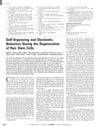Local Circadian Clock Gates Cell Cycle Progression of Transient Amplifying Cells During Regenerative Hair Cycling

TLDR Hair grows faster in the morning and is more vulnerable to damage from radiation due to the internal clock in hair follicle cells.
In the 2013 study, researchers found that the local circadian clock within hair follicle cells creates a rhythm in cell division, leading to faster hair growth in the morning. This rhythm also makes hair follicles more susceptible to DNA damage from radiation in the morning when cell division is at its peak. Experiments with wild-type mice showed significant hair loss when exposed to radiation in the morning, but not in the evening, while circadian mutant mice showed consistent hair loss regardless of radiation timing. The study concluded that the circadian clock coordinates cell cycle progression with genotoxic stress responses, which could influence the timing of radiation therapy to minimize damage to proliferating cells. The study involved various mouse models and was supported by multiple grants, including from the National Institutes of Health.








